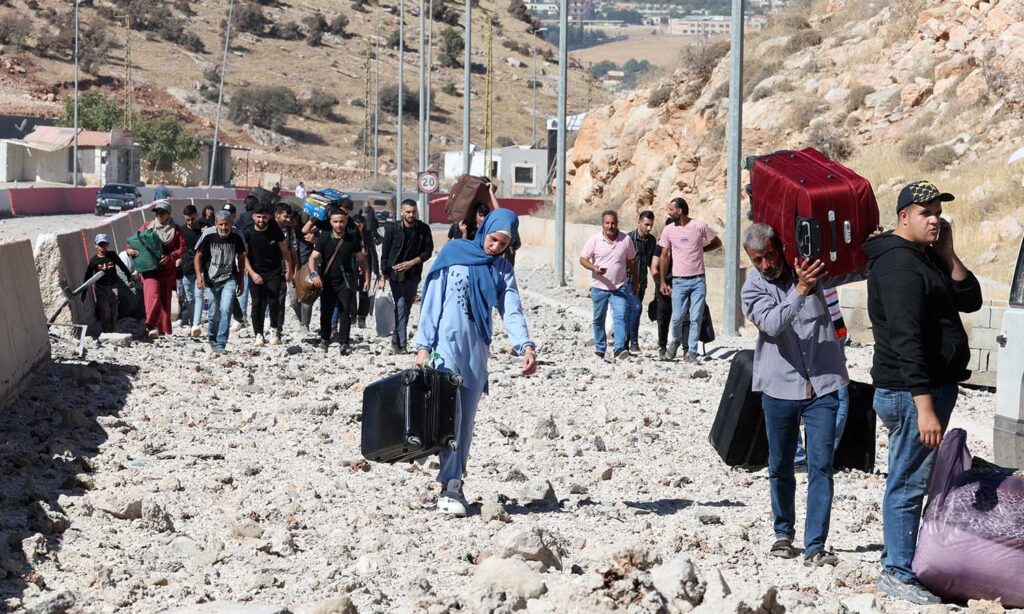The Israeli bombing that targeted the Masnaa border crossing between Syria and Lebanon has exacerbated existing export problems in this sector in regime-controlled areas.
The local al-Watan newspaper quoted the head of the Union of International Freight Transport Companies, Saleh Kishour, stating that the number of Syrian commercial trucks sent to Lebanon was between 30 and 40 trucks daily, but their movement has currently ceased.
He added that Syria exports clothes, cotton goods, plastics, and all foodstuffs to Lebanon, except vegetables and fruits.
The Israeli escalation in Lebanon will have “a significant impact on the flow of locally manufactured goods” in the coming period, especially since many of the raw materials involved in their production are imported, which could raise prices if there is no solution, according to Yasser Akreem, a member of the Damascus Chamber of Commerce.
Akreem also noted that due to importers’ fears (via Lebanon or elsewhere), currently imported consumer goods have witnessed a significant contraction.
Since Lebanon is a primary source of oil derivatives sold on the roads, tensions have led to a shortage of these materials, affecting transportation and craft workshop operations, especially craftsmen who buy their needs of oil derivatives at free market prices from the black market, according to Akreem.
Israel bombed the Masnaa crossing on the Syrian-Lebanese border on October 4, which led to the road being cut off. The biggest victims of this were the refugees fleeing from Lebanon to Syria.
The Lebanese Minister of Transport told Reuters that the Israeli bombing created a four-meter diameter crater and cut off the road linking Lebanon and Syria, used by hundreds of thousands to escape Israeli bombing.
The Masnaa crossing is one of the six main legal crossings that connect Lebanon with Syria by land, located on the Damascus-Beirut road.
These crossings have witnessed a wave of displacement following the military escalation by Israel on areas in southern Lebanon and Beirut.
The number of Syrians and Lebanese who entered Syria due to the Israeli escalation against Lebanon reached 223,000 Syrians and 82,000 Lebanese, according to al-Watan citing a source in the Immigration and Passport Department.
Already an affected sector
The export sector already suffers from many problems hindering its growth, according to Kishour, most notably internal laws and the hindrance of Syrian trucks entering Jordan, especially since Syrian exports are limited to Lebanon, the Gulf, Jordan, and Iraq.
Syria exports daily 10 refrigerated trucks of vegetables and fruits to Gulf countries (a truck can hold 25 tons), and 25 refrigerated trucks to Iraq.
On July 29, the Union of International Freight Transport Companies in Syria stated that the restrictions on Syrian trucks by the Jordanian side caused spoilage of goods in 150 Syrian trucks over a month and a half.
Operations in the Syrian-Jordanian Joint Free Zone were halted due to “new complex procedures” imposed by Syrian customs, hindering work, as explained by the Jordanian President of the Owners of Clearance and Transport Companies Association, Dhaifallah Abu Aqoulah.
Abu Aqoulah stated in July that over 500 trucks on the Jordanian side were stalled due to “new arbitrary procedures,” leading to significant losses due to stalled trucks and goods. He added that the Syrian side banned organizing any documentation for trucks heading to Syria without approval from the Syrian Customs Department, which led to truck movement disruptions and work confusion, as the approval takes days.
On the other hand, the Ministry of Economy and Foreign Trade in the regime government denied any hindrance to the entry of Jordanian trucks into Syria on July 23.











